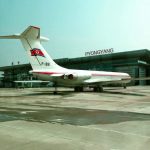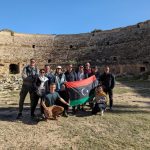My fascination with North Korea began in 2008 while studying for my masters degree in International Relation. I have spent the last 8 years peering through the window wondering what it was really like on the other side. I travelled to Korea last week for the first of hopefully many trips and the country that promised so much delivered much more than expected.
I went in expecting to be led by stern government “minders” who would spend the entire time telling me what I cannot do, while taking us to very few select places. What occurred in fact was quite the opposite.
Here are 5 things that I learned only by travelling to the DPRK.
1. North Korea is a remarkably beautiful country and this is something that no documentary will portray.
We drove east from Pyongyang to Hamhung the second largest city and then north to Pujon, and south again to Majon on the East coast. We encountered everything from rolling green hills, stunning valleys and waterfalls to beautiful untouched beaches. All without a single tourist in sight.
2. Photo and video is tolerated and even encouraged.
I took photos of everything that I wanted too. The only things I couldn’t photograph were Military and shop interiors. Luckily taking pictures of food on display in supermarkets was not at the top of my agenda.
The entire country is a photographer’s dream just waiting to be tapped. I walked away with over 1,000 photos of the country and like anywhere in the world, people are happy to be photographed as long as you approach with a smile.
3. The local Korean tour guides are extremely helpful, entertaining, and really want you to enjoy yourself.
They go out of their way to make sure this happens. They arranged seafood BBQs at the beach, bought us all ice creams and changed the itinerary at the drop of a hat if that’s what people wanted. One of our guides, Mrs Pak even took us to her local watering hole for 50 cent pints of beer! I was amazed at how open, funny and “normal” they were compared to how they can be portrayed on Vice and BBC documentaries etc.
4. The country is slowly opening more and more to tourism.
Jagang Province in the North is the only province closed to foreigners. Tourists now have a large amount of places to choose from and activities to do from the DMZ all the way up to Rason in the North East. Some places, such as Humhong and pujon only opened to foreigners in 2012, contrary to some people beliefs it’s not possible to travel outside of Pyongyang and the DMZ. Everywhere we visited we received a remarkably warm reception from the locals. For many it was the first time they had seen and interacted with Westerners.
5. Not every activity is set in stone.
We shifted the itinerary around multiple times depending on weather and the feeling of the whole group. While we were in Pyongyang we added a trip to the circus and a local pub which had only just opened up to foreigners. Every day is action packed as soon as you leave the hotel in the morning to that last sip of beer after mid- night. Every day is as unique and unexpected as the next.
North korea is an untouched jewel in global tourism. Unfortunately most will shy away from visiting out of safety concerns or due to personal moral concerns. Tourism is a form of cultural engagement that is mutually beneficial. Any arguments against it seem to me outweighed heavily by the benefits of engagement with, and understanding of, the people and culture.
Whilst you cannot roam freely by yourself like other countries, there’s a hell of a lot you can do contrary to what the media would have you believe. We visited water parks, fun fairs, schools, bowling alleys, circus’, had a beach BBQ party, went swimming at the DMZ on the East coast…all things I never imagined were possible.
The people are warm, inviting and eager to meet and learn from foreigners. it’s truly a unique and wonderful experience. The future is bright, just don’t believe every story you hear coming out.





